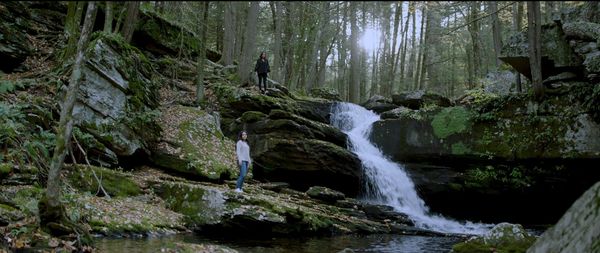Eye For Film >> Movies >> This Teacher (2018) Film Review
This Teacher
Reviewed by: Amber Wilkinson

The nature of identity, both self-sculpted and thrust upon us by the outside world are considered in Mark Jackson's This Teacher - which recently won the US Fiction prize at Los Angeles Film Festival. Hafsia (Hafsia Herzi in a role that was specifically created for her by Jackson and his co-writer Dana Thompson) is a young woman whose life, although only glancingly referred to, seems to be stuck in a rut - speaking of the hassle of home, she says: "It's everything. It's exhausting".
Perhaps that's why she's taken the offer of her childhood friend Zahra (Sarah Kazemy) of a plane ticket to visit her in New York. The 10 years since their last meeting have had a more profound affect on Zahra, an actress, than Hafsia. Now dating a much older white guy, she's switched her name to Sarah for the ease of his white bread friends and seems to have taken to acting a different role in her real life, with her Muslim friend shocked by her revealing outfits and newly discovered taste for drink. This idea of 'acting' out roles runs through the film, initially in a literal way but, later, more subliminally.

A party, just the beginning of the various ways Jackson will make many liberal-identifying white viewers cringe over the course of This Teacher, sees everyone treat Hafsia as though she's completely defined by her religion. One guy, cornering her, immediately starts in on the things he dislikes about the modest dress of Muslim women, before almost accusatorily asking her why she isn't wearing a hijab, paradoxically attacking conformation while simultaneously calling for it. Jackson - whose press notes for the film display a boiling anger for Trump's America - is interested in the way that despite some people's apparently open views, it doesn't take much of a scratch on the surface for altogether more poisonous, prejudiced opinions to start to leak out. This isn't racism as white sheet-wearing, torch-bearing awfulness, but the more 'respectable' version that looks squeaky clean and masquerades as 'tolerant' while being insidiously malevolent.
The film is split into three parts and this first offers an interesting take on New York. Usually presented as a scrum of people and noise in films, for Hafsia it becomes more of an oasis of calm and quiet - part of Jackson's skill is in flipping suddenly between quiet and loud moments to generate tension. When it turns out the reunion is not for the best, Hafsia uses her old friend's credit card to book a cabin in the woods and steals her identity into the bargain, telling the man who runs the place she is Sarah, a nurse.
It's at this point that Jackson's film, which refuses, like its central character, to be defined, becomes an intense character study, showing what happens to Hafsia when she is left truly isolated - for good and ill - before bringing the action back to the unexpected prejudices and the darker tendencies of humanity in a final segment concerning a couple, teacher Rose (Lucy Walters) and policeman Darren (Kevin Kane), who rent the neighbouring cabin.
Herzi commands attention in the central role - her performance offers a similar potency to Helena Howard in Madeline's Madeline - as her character experiences something lurking on the knife-edge between divine revelation and mental breakdown. While the story of Hafsia's religious epiphany feels sketchily written compared to other parts of the film, the unpredictability of the emotions - ranging from almost zen-like calm to turn-on-a-dime anger - ensures Jackson keeps us constantly on edge. He creates an environment and sense of unspecified dread that makes you feel virtually anything could happen at any moment, which builds to a toe-curling anxiety in the film's third segment.
The difference between the way the Rose and Darren treat Hafsia over the course of an evening, based on assumptions, is stark. Just like the title, it's a "this" and "that" situation and being "that", Jackson shows us, can easily become a problem in a world still dominated by prejudice.
Reviewed on: 10 Nov 2018














